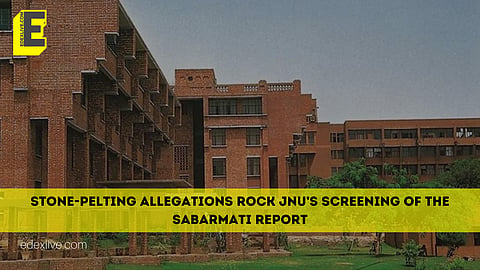

Jawaharlal Nehru University (JNU) witnessed some drama today, Thursday, December 12, evening during the screening of the controversial film The Sabarmati Report. Organised by the ABVP at Sabarmati Dhaba, the event was marred by allegations of stone-pelting, contrasting claims from student leaders, and renewed debates about communal propaganda and free speech on campus.
Rajeshwar, Akhil Bhartiya Vidyarthi Parishad (ABVP) President of JNU, stated that their screening of The Sabarmati Report was attended by over 1,100 students after securing the required permission from the university.
According to him, trouble began just 15 minutes into the event when pebbles were thrown at the gathering from the darkness. “When our volunteers and guards tried to investigate, no one was found. Soon after, larger stones were thrown, slightly injuring a few students. Thankfully, no one was seriously hurt,” he alleged.
Rajeshwar accused left-aligned student groups of orchestrating the attack, claiming, “They were already opposing the event and have disrupted similar programmes in the past. We will file an official complaint with the registrar.”
However, Dhananjay, President of the JNU Students’ Union (JNUSU), dismissed these allegations as a baseless “publicity stunt.” He ridiculed the ABVP’s claim of 1,100 attendees, saying, “There is no space for even 500 people to gather at Sabarmati Dhaba. This exaggerated number is just part of their propaganda.”
Dhananjay further alleged that the incident was staged by ABVP itself. “A police constable who was present told me that one of their own members threw the stones. The campus is completely peaceful; there has been no violence here,” he asserted.
Avijit Ghosh, Vice-President of JNUSU, also refuted ABVP’s claims, describing it as a deliberate attempt to spread misinformation.
“No such stone-pelting happened. This is part of their strategy to malign other student organisations. The film and its screening are nothing but a political and communal propaganda exercise designed to polarise the campus, just like they did with The Kashmir Files and The Kerala Story,” he said.
The SFI, one of JNU’s prominent left-aligned student organisations, had earlier condemned the screening of The Sabarmati Report. In a strongly worded statement, they described the film as “a blatant propaganda tool that distorts historical events to push a communal and exclusionary agenda.”
The statement accused ABVP of using the tragic events of 2002 to polarise the campus and undermine JNU’s ethos of secularism and critical inquiry.
With opposing claims and heightened tensions, the controversy has once again spotlighted the deep ideological divisions within JNU.
Whether the stone-pelting was an orchestrated ploy or a genuine disruption, one thing is certain — the debate over free speech and propaganda on campus continues.
